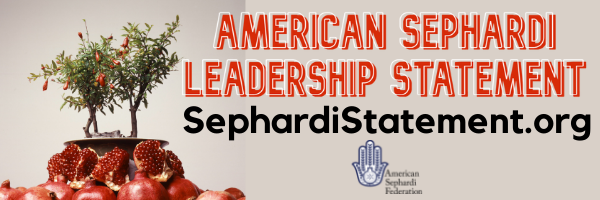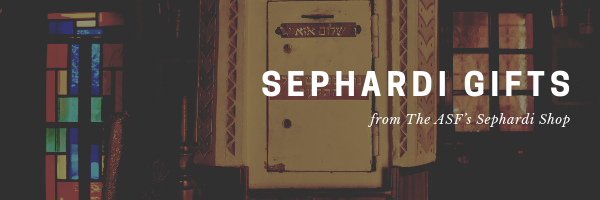Mazal tov to Lauren Gibli (President, ASF Young Leaders) and Steive Hornik on their beautiful Yemenite henna party. We are so proud of them for choosing to celebrate and perpetuate our ancient Jewish culture. In the words of Song of Songs, we sing to you: “I am my beloved’s, and my beloved is mine... The voice of my beloved! behold, he cometh leaping upon the mountains, skipping upon the hills.” May your life together be a blessing to your families and the whole Jewish people.
The Sephardi World Weekly is made possible by Professor Rifka Cook, Maria Gabriela Borrego Medina, Rachel Amar, Deborah Arellano, and Distinguished ASF Vice President Gwen Zuares!
Click here to dedicate a future issue in honor or memory of a loved one
🎙️“The Jews of the Middle East: Zionists Before Zionism”
By Andrew Doran, National Review
Ofra Haza appeared on The Tonight Show on 9 March 1990. Johnny Carson thought she was from Yemen. Haza responded: “I was born in Israel. My parents came to Israel from Yemen... in 1929, before Israel became a state.... They came with the great historical yearning for Zion and Jerusalem.”
(Screenshot courtesy of YouTube)
Philos Project Senior Research Fellow Andrew Doran points to a massive but often forgotten fact of modern Middle Eastern history: “Most of the world knows the tragedy of the Palestinians, roughly 700,000 of whom were displaced in 1948 after five Arab armies attacked Israel before it was even a day into its existence. Most of the world does not know, however, that an even greater number of Jews living in the Middle East were forcibly expelled from their own countries in 1948 and the years that followed simply for being Jewish. Most of them took refuge in Israel.” But the implications of this overlooked fact aren’t only geopolitical. Today, the descendants of these Sephardic Jews constitute a majority of Israel’s population, and they have left a distinct stamp on Israeli culture and society: “Israel’s pivot away from the secularism and socialism of its founding decades is due, in part, to the traditional tendencies of its Middle Eastern Jews.” Bottom-line: the story of Israel, and Israel’s integration into the region, should be seen, in large part, as an internal Middle Eastern story.
Feature: Sights and Sounds from the 2nd Jewish Africa Conference in Rabat, Morocco 🎶🤝
Presentation of the Moses, the African Jewish Leadership Awards at the 2nd Jewish Africa Conference, Policy Center for the New South, Rabat, Morocco. (L to R): Elmehdi Boudra (Founder & President, Mimouna Association), HE René Trabelsi (Former Minister of Tourism, Tunisia), HE Belaynesh Zavadia (Israel’s 1st Ethiopian-Israeli Ambassador), Malcolm Hoenlein (Vice Chair, Conference of Presidents of Major American Jewish Organizations), HE Jorge Santos (Minister of Cabo Verdean Communities), Shaun Zagnoev (President, South African Jewish Board of Deputies), Andrea Berry (Strategic Director of the Pupkewitz Group), Professor Ephraim Isaac (Founder, Ethiopia’s Peace & Development Center), Jason Guberman (Executive Director, American Sephardi Federation), & Abdeslam Filali (Vice General Secretary, Mimouna Association).
(Photo courtesy of Zakaria Siraj)
Enjoy sights and sounds from the 2nd Jewish Africa Conference that was held for three amazing days from last month in Rabat, Morocco. The Mimouna Association and American Sephardi Federation brought together officials, community leaders, scholars, rabbis, and entrepreneurs from 22 countries to celebrate and explore the past, present, and future of Jewish Africa. The highlight of the 2nd Jewish Africa Conference was the signing of the “Call of Rabat,” a proclamation that aims to raise awareness, ensure access, and promote preservation of African Jewish heritage across the continent.
🎶“Saving Historic Songs, and a Jewish Culture in Morocco”
By Aida Alami, The New York Times
Dr. Vanessa Paloma Elbaz with the savior of Tangier’s Jewish community, Sonia Cohen Toledano, Aaron Abikzer (VP of Tangier’s Jewish community), Elmehdi Boudra (Founder & President, Mimouna Association), and Jason Guberman (Executive Director, American Sephardi Federation), Sephardic Home for the Aged, Tangier, Morocco, 19 August 2021
(Photo courtesy of Tangier Jewish Community)
Many Jewish women in Morocco used to sing Spanish-language romances “to put their babies to sleep, or in the kitchen preparing Purim cakes. They sang in courtyards at night when the men were at synagogue for evening prayer, songs of love, loss, religion and war.” But Moroccan Jews have been dispersed around the world, and these oral traditions are fast disappearing. However, Dr. Vanessa Paloma Elbaz, a Cambridge University-based ASF Broome and Allen Fellow, has spent the past fifteen years “collecting and archiving the voices of aging Jews in Morocco” and pioneering the study of written archival sources, adds a piece to the puzzle: “‘If we think we have no written text from the women, we are wrong… Some archives were sitting in Spain and nobody was paying attention to them.’”
~~~~~~~
The American Sephardi Federation invites all individuals, communities, and organizations who share our vision & principles to join us in signing the American Sephardi Leadership Statement!
Please also support the ASF with a generous, tax-deductible contribution so we can continue to cultivate and advocate, preserve and promote, as well as educate and empower!
~~~~~~~
Mystic Siren: Woman’s Voice in the Balance of Creation
By Dr. Vanessa Paloma Duncan-Elbaz (ASF Broome & Allen Fellow)
Mystic Siren is about women’s spirituality, Jewish mysticism, and Sephardic musical and cultural traditions. Beautifully illustrated by Gloria Abella Ballen, an award-winning artist recognized by the National Endowment for the Arts, Mystic Siren is a unique artistic and scholarly collaboration between a talented mother and daughter team.
“This little book is an unusual mix of fable and spiritual wisdom that will elevate and enrich the reader, even the parent who is reading to the child.” ~David Suissa
“Vanessa Paloma... is a passionate scholar and performer of songs from the Sephardic Diaspora from North Africa to Turkey...” ~National Public Radio
“Paloma...brings this richness of heritage to her work as an author, performer, teacher and preserver of Ladino songs and music.” ~Here & There, Hadassah Magazine
Jewish Women from Muslim Societies Speak
Published by the American Sephardi Federation and Hadassah International Research Institute on Jewish Woman at Brandeis University
Jewish women from Morocco, Egypt, Turkey, Lebanon, and Iran were invited to share their personal stories. It could be said that these women's voices are from the last generation of Jews to have an intimate personal knowledge of the Muslim world, the enormous diversity within and among Middle Eastern Jewish communities.
We hope that these essays, told through the medium of vivid personal stories, will stimulate discussion about contemporary dynamics in the Muslim world and raise awareness of Jewish women’s history in North Africa and the Middle-East.
~~~~~~~
Upcoming Events or Opportunities
ASF Broome & Allen & ADL Collaborative for Change Fellow Isaac de Castro presents:
Entre Diasporas: Telling the Latin-American Jewish story. Contando la historia judía latinoamericana
Tell your story. Cuenta tu historia.
We’re looking for first-generation Latino Jews in the United States who immigrated because of political and social turmoil. Jews of Sephardic descent from Colombia, Cuba, and Venezuela that now reside in the Miami area will be given priority, but others are welcome to apply as well.
Fill out this form to be considered as an interviewee for this project. After you’ve submitted, we will be in touch promptly to set up a preliminary phone call.
Click here for more information.






